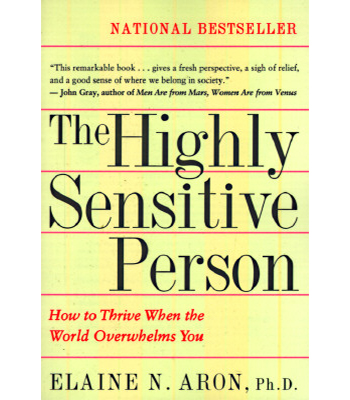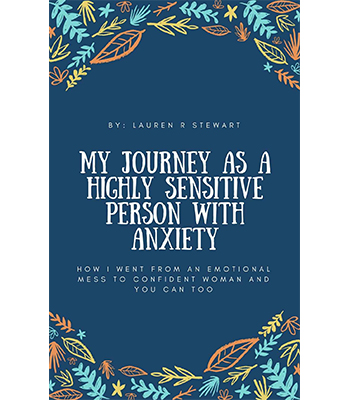Karen Malczewski of Naperville, Illinois, has felt emotions intensely her entire life. She’s always had an abundance of empathy and a strong tendency to think deeply about topics. Amy Litterski of Chicago says she often feels “overstimulated and overwhelmed.”
Lauren Stewart of Michigan is sensitive to bright lights and loud noises. She has also experienced feelings on a level that most of her peers do not. “I had always internally beat myself up because I cried so often — I cry when I’m happy, sad, angry, etc.”
It was only once each of these women learned about what it means to be a highly sensitive person that they began to understand why they had such intense feelings. “A lot of things clicked,” says Stewart.
“So many highly sensitive people spend their lives feeling like ‘something’s wrong with me’ and it turns out there’s nothing wrong. They’re just highly sensitive people,” explains Kristin Young, licensed psychotherapist and relationship counselor with offices in San Francisco and San Rafael, California.
What is a Highly Sensitive Person?
Elaine Aron, Ph.D., first brought attention to the trait with her book “The Highly Sensitive Person” in 1996. The trait is sometimes called Sensory Processing Sensitivity, which is described as a “normal temperament variation” and does not cause impairment or distress. (It is not Sensory Processing Disorder.) Most often, it’s known as Highly Sensitive Person, or HSP for short.
 HSPs have nervous systems that pick up more sensory input than normal. Aron writes that brain scans of HSPs have confirmed this and show that they also process that input deeply. They are aware of subtleties in their environments, and they are more likely to become overwhelmed by the sensory input.
HSPs have nervous systems that pick up more sensory input than normal. Aron writes that brain scans of HSPs have confirmed this and show that they also process that input deeply. They are aware of subtleties in their environments, and they are more likely to become overwhelmed by the sensory input.
For example, Aron says HSPs are likely to have strong reactions to loud noises or violent movies, become frustrated when asked to do too much, and observe small shifts in their surroundings. You can take the “Are You Highly Sensitive?” quiz on Aron’s website. However, Aron cautions against using a brief pen and paper quiz to determine if someone has an innate temperament trait such as being highly sensitive.
Instead, she recommends reading more extensively about the trait. She specifically recommends focusing on four facets of high sensitivity: depth of processing, being easily overstimulated, sensitivity to subtle stimuli, and emotional responsiveness/empathy. It’s also possible that an HSP-knowledgeable therapist can offer assistance, too.
“Sometimes I can tell within the first five minutes of meeting with someone who is highly sensitive,” says Young. “I shy away from it coming from me, though, because I want it to come from each person’s own understanding of themselves. Sometimes when I start telling someone about the traits, their eyes will widen and they start nodding.”
The trait is not rare. Aron explains in her book and on her website that 20 percent of the population is highly sensitive. It impacts men and women and while it is more commonly found in introverts, Aron estimates that 30 percent of HSPs are extroverts.
It’s not found solely in humans, either. Approximately 20 percent of all mammals are highly sensitive.
While one in five sounds like a lot of individuals, highly sensitive people often feel isolated and misunderstood. “While 20 percent is a decent portion of people, our culture really values the more extroverted ‘push yourself through life’ mentality. HSPs often feel like more of a minority than we actually are,” says Young.
She says that HSPs often have to justify what they need to thrive, a struggle that people who are not highly sensitive don’t face, and this can make them feel alone.
How to thrive as a Highly Sensitive Person
“My top tips on how to leverage high sensitivity as a strength is to, first of all, be proud of who you are,” says Stewart, author of “My Journey as a Highly Sensitive Person with Anxiety” and other books about HSPs, and founder of a website devoted to helping HSPs.
 Litterski finds that focusing on the positive aspects of the trait and what it allows her to do helps her appreciate it. “One thing that I believe my sensitivity enables me to do is feel a great deal of empathy for a variety of people and their circumstances. It is easy for me to listen, understand, and really recognize the discomfort in others,” she says.
Litterski finds that focusing on the positive aspects of the trait and what it allows her to do helps her appreciate it. “One thing that I believe my sensitivity enables me to do is feel a great deal of empathy for a variety of people and their circumstances. It is easy for me to listen, understand, and really recognize the discomfort in others,” she says.
Malczewski agrees. As a licensed clinical social worker, therapist, and owner of Kindred Counseling, she sees many people who are also HSPs and says, “It comes with such gifts,” explaining HSPs can find a special richness in their lives and forge particularly deep connections with people.
That said, the therapists agreed that HSPs need a higher level of self-care overall.
“The emotions can be overwhelming, and you have to learn how to bring it in and not let it run away with you,” says Malczewski.
Here, Malczewski offers five approaches that can help HSPs thrive:
1. Find friends who are also HSPs. “Finding people who both get what it’s like to feel this way and who can connect with you on a deep level can be very soul fulfilling,” Malczewski says.
2. Prioritize one-on-one time with people, because it can nourish an HSP in ways that groups do not.
3. Know what overwhelms you and limit it. For example, Malczewski says that she knows she cannot overschedule herself because doing so is overwhelming.
4. Be kind to yourself. HSPs are often very critical of themselves, but taming that can go a long way.
5. Self-care is crucial. “Know what feeds you. I’m in favor of that for anyone, but it’s especially important with this trait,” she says.
How to thrive in relationship with someone who is highly sensitive
Just as it’s beneficial for HSPs to view the trait as a positive one, their friends, family, and partners can also benefit by taking a similar view.
“HSPs bring a deep sense of caring and openness and love to a relationship,” says Young. “They have a deep level of care and the people close to them can really feel that.”
Malczewski emphasizes the importance of accepting HSPs as they are. “It’s a trait and just how people are, just like whether they’re introverts or extroverts. Being able to understand both sides is important,” she says.
Learning how to communicate more thoroughly is an important part of being in relationship with an HSP, and that’s something that Young says “can take a lot of practice.” She also recommends frequent check-ins and acceptance that the other person is different, but not wrong for needing something other than what their partner needs, whether that’s more down time or not watching a violent or gory television show.
Stewart suggests that HSPs be honest with those around them about their traits and what triggers they may have, be it noises, smells, crowds, or other stimuli. Non-HSPs need information to understand how the nervous system of a sensitive person responds so differently from their own. She says simply asking what the other person may need and being gentle can go a long way.
Feature photo by Ant Rozetsky on Unsplash.
 Shannan Younger is a writer living in the western suburbs of Chicago with her husband and teen daughter. Originally from Ohio, she received her undergraduate and law degrees from the University of Notre Dame. Her essays have been published in several anthologies and her work has been featured on a wide range of websites, from the Erma Bombeck Humor Writers Workshop to the BBC. She also blogs about parenting at Between Us Parents.
Shannan Younger is a writer living in the western suburbs of Chicago with her husband and teen daughter. Originally from Ohio, she received her undergraduate and law degrees from the University of Notre Dame. Her essays have been published in several anthologies and her work has been featured on a wide range of websites, from the Erma Bombeck Humor Writers Workshop to the BBC. She also blogs about parenting at Between Us Parents.
Shannan is the Illinois Champion Leader for Shot@Life, a campaign of the United Nations Foundation that supports vaccination efforts in developing countries to ensure life-saving vaccines reach the hardest to reach children. “Vaccines are one of the most effective ways to save the lives of children in developing countries and I’d love nothing more than to see diseases eradicated,” Shannan says. “We are so close to getting rid of polio for good!”

